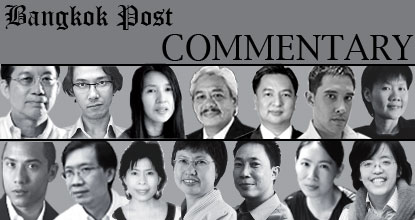
That Sirichai Maichum, the security officer at Suvarnabhumi Airport who got his ears smacked by a high-ranking customs official till an ear drum ruptured, is distraught and worried about his career and his own safety after the assault, should have been a big slap in the face of Thai society. It should have hurt badly. And something should have broken. Something should have changed.
But of course, the reality is that the Thai moral fabric of resilience and tolerance is too tough. What should have sparked a prolonged uproar, a watershed moment that led to some real changes for equity on the scale of the Rosa Parks incident, ended up being merely the "talk of the town," an entertainment which keeps people amused for a few days but ends up in a whimper leading to no tangible improvement.
In reality, it's only natural that a low-ranking someone would feel worried for his personal well-being and professional future if he or she rubs a high-ranking someone the wrong way, even in the course of performing his rightful duty. It's fact of life. It's scandalous, but eventually it is tolerated.
Mr Sirichai should count himself lucky that the attack on him was caught on video and released for the public to see. Had this not been so, chances are high that his ear drum would have been ruptured for free.
It's true that in this case people got excited and agitated about the video clip of the ear-splitting incident at Suvarnabhumi Airport. The incident was talked about so much that the highest-ranking officer at the Customs Department immediately transferred the officer in question and set up a committee to investigate the incident.
But what about other similar abuses of power that are not caught on tape?
The truth is, incidents like this one _ a high-ranking official flouting the rule, abusing his power and mistreating people of a lower status _ happen all the time in this country.
Of course, if even a scandalous case caught on tape has failed to make a dent in the culture of abusing one's authority, and succeeded only in making the victim feel scared and insecure, then what hope do we have?
Based on my own experience, hardly a day passes by in which I do not witness or experience the flouting of rules by my fellow citizens. Just last Friday, for example. I went to have lunch at a popular noodle shop. I parked my car by the sidewalk away from the shop, only to see two big Mercedes taking a convenient spot right opposite the shop but which is actually a bus stop. It did not bother the well-dressed drivers that the incoming bus would have to stop in the middle of the road to pick up passengers.
On the same day, I went on to redo my passport. The rule there is that we take a ticket and the officer will call in 30 people at a time according to the ticket number.
In reality, people can expect that their number will be up in the next 30-number lot. So instead of waiting until their number is called, which is the according to the first-come, first-served rule, some people would run to the station as soon as the first number of the 30-lot is called. I know because I saw quite a few people who arrived at the office later than me and whose ticket numbers were after mine, but who got served before me.
It's no big deal but I do wonder why would the passport office take the trouble of having the numbering ticket system without enforcing it effectively, and why would people jump the queue for the sake of speeding up their business by only a few minutes?
While we are at it, I have another story which may rekindle our hope for the future. My sister-in-law was helping with a garbage recycling activity on Children's Day this past Saturday. A secondary school boy told her: "Big Sister, I am in a hurry. Can you give me a stamp without my having to play the game?"
Sensing a trick, my sister-in-law said: "But I am in no hurry. Let's play the game first. It is good knowledge."
"Phi jai rai, cruel Big Sister," the boy cried.
"Go ahead and get in line. Your friends who are also in line won't like it if I give you a free stamp," my sister-in-law said.
Responding to her remark was a chorus from all the children in the queue: "We will agree to it. You give us free stamps too, so that we won't have to play the game!" Naturally, my sister-in-law said no, and she received a louder chorus of "Phi jai rai" in return.
Again, the incident itself is no big deal but it may give us an explanation as to how the ear-smashing incident at Suvarnabhumi could happen and how, no matter how scandalous it was, it is likely to change nothing.
Atiya Achakulwisut is Deputy Editor, Bangkok Post.
